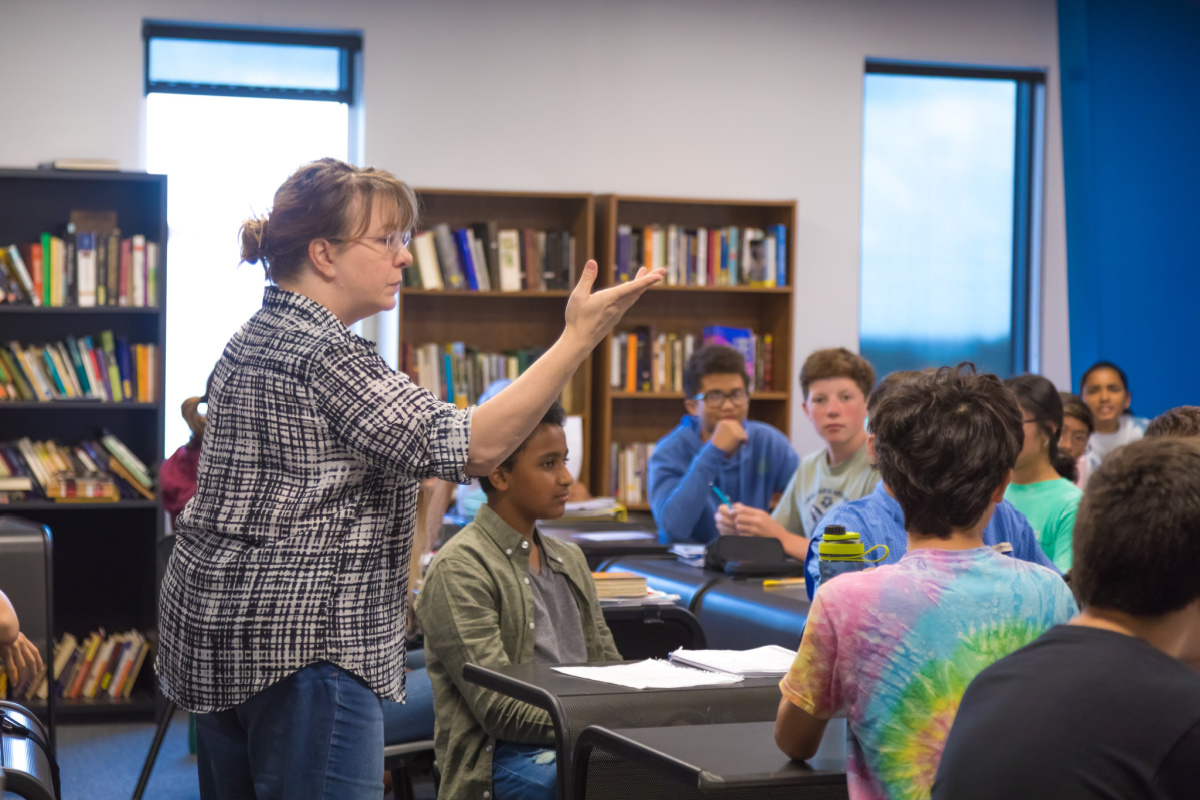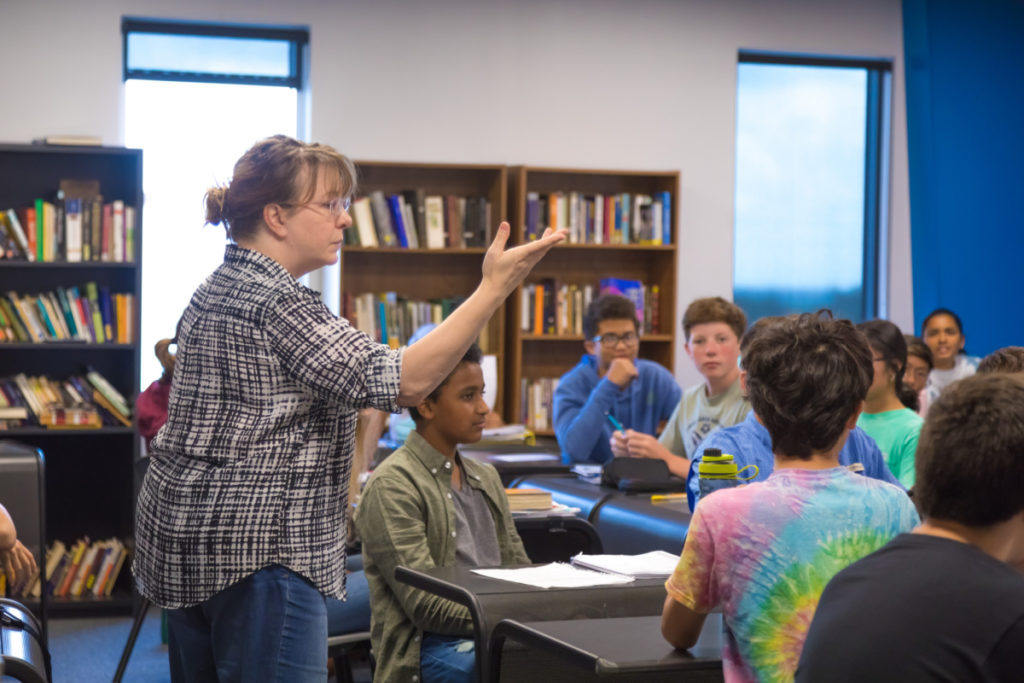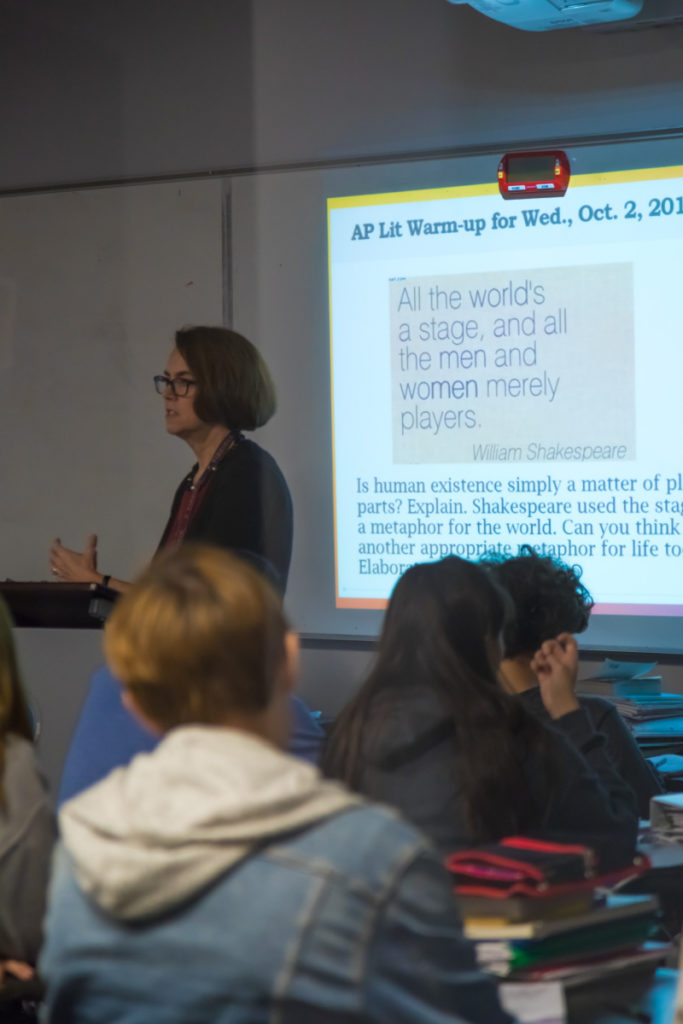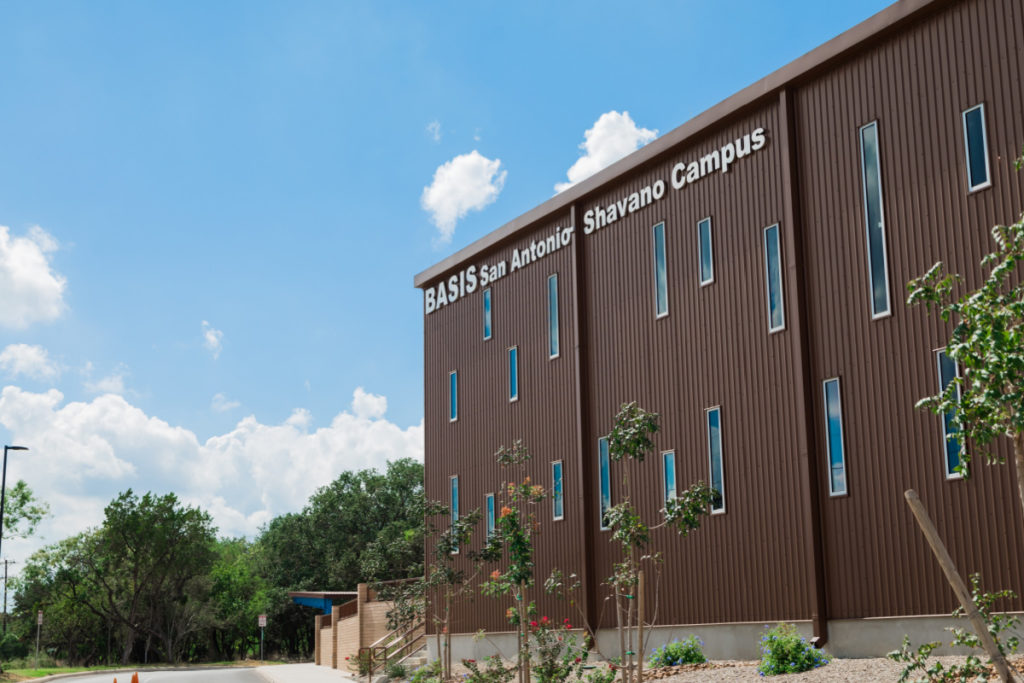Reading and writing are the building blocks of learning. When students have a strong foundation in language and literacy, it opens up the door to academic and professional success. It also helps them expand their worldview, appreciate different perspectives, and communicate effectively with others. A strong English program—spanning from developing basic language and literacy skills to engaging in high- level literary analysis and advanced composition—is an integral part of a successful K–12 curriculum.
Below, BASIS San Antonio Shavano English teachers Robin Martin, Kim Kinne, and Mark Petrie discuss unique aspects of the BASIS Charter School English program that not only allow students to excel in language and literature, but also provide them with invaluable skills for success in college and beyond.
An Overview of the BASIS Charter School English Program
Designed to Challenge and Inspire
While a school’s curriculum provides the necessary framework for the English program, the teachers are the ones who bring it to life in the classroom. When English teachers extend their knowledge and enthusiasm to students in class, leading lessons with creativity and purpose, students are more likely to stay engaged and interested and can move at a faster pace.
One unique aspect of the BASIS Charter School Curriculum is that it allows teachers to have a great deal of autonomy in the classroom. This is especially helpful for English teachers, who can present subject matter in their own way and design challenging courses with lessons that appeal to different learning styles. BASIS San Antonio Shavano grade 6 English teacher Robin Martin explains this, saying, “The freedom at BASIS Charter Schools is remarkable. I love that I can teach what would traditionally be considered material for grades 8 and 9 to students in grade 6. And I love that the administration supports creative approaches to content.”
Through the Lens of Literature
While keeping fundamental requirements in mind, most English teachers, especially at the middle and high school-levels, have the opportunity to choose their own reading materials. This is something that BASIS San Antonio Shavano AP Literature and Composition teacher Kim Kinne enjoys immensely, as she always strives to choose a wide range of literature that she believes will resonate with her students. “We cover different genres (from poems and short stories to drama and novels) and different time periods (from the Renaissance through Post-Modernism), and we read works from both the Western and non-Western canon,” she says.
As students engage with a wide variety of texts, they simultaneously sharpen their reading comprehension and critical thinking skills through literary analysis. Ms. Kinne says she encourages her students to approach every text critically, so they are able to appreciate literature at a higher level. She explains, “Great authors help us understand the human condition and wrestle with the questions that have intrigued us for millennia—they eloquently give voice to what we intuitively feel but can’t always express.” With this approach to literary analysis, students no longer see a novel as just words on pages, but as a lens through which they can view situations from many perspectives.
The Art of Essay Writing
Just as fundamental as approaching texts critically is the ability to convey ideas and connections gathered from texts in writing. BASIS San Antonio Shavano English teacher Mark Petrie explains the connection between literary analysis and writing, saying, “Students learn how to recognize connotations in the texts that they read, and how to make logical connections and strong arguments. This not only improves their writing, but helps them to be more creative, critical thinkers.”
Being able to write effectively and express ideas concisely are essential parts of communication, and critical skills for academic and professional success, so it is important for English teachers to infuse writing into their lessons whenever possible. Mr. Petrie describes how he does this saying, “My students practice writing in-class literary essays to prepare for the AP exam and they write essays based on literature and interdisciplinary projects.” Ultimately, by the time Mr. Petrie’s students are ready to work on their BASIS Diploma Senior Projects—intensive, self-directed, original research projects of each student’s choice and design—they have mastered organizing their thoughts and arguments into a well- crafted paper.
Beyond guiding students to achieve academic success, BASIS Charter School English program teachers always strive to instill a lifelong love of reading and writing in them. Mr. Petrie says this is the true magic of being an English teacher, seeing students engage with literature and apply it to their own lives. “When a student reads a book that I mentioned on their own and comes back to me and wants to talk about it—when a student becomes interested in exploring literature outside the classroom—that is the most rewarding element of what I do,” he explains.
When a school has a strong English program, students not only learn vital critical thinking, analysis, and writing skills that will benefit them throughout their lives, but they also gain insight into and appreciation for how other people view different situations and the world around them.
BASIS Charter Schools in Texas are open enrollment, tuition-free public charter schools serving grades K–12. They offer a STEM-infused liberal arts curriculum, a co-teaching model for the primary grades, and a wide variety of academic courses and extracurricular activities. San Antonio campuses include BASIS San Antonio Shavano, BASIS San Antonio Northeast, BASIS San Antonio Primary—Medical Center Campus, and BASIS San Antonio Primary—North Central Campus. Austin campuses include BASIS Austin and BASIS Austin Primary.
Learn more about the BASIS Charter School English Program at enrollBASIS.com and in the enrollment guide blog post.
Read More About BASIS Charter Schools
- “Senior Projects at BASIS Charter Schools,” San Antonio Charter Moms, March 30, 2021
- “Kitchen Chemistry: Snowstorm in a Bottle,” Audrey Hagopian, San Antonio Charter Moms, January 29, 2021
- “Kindergarten Is More Important Than You Think,” Eric Wiederlight, San Antonio Charter Moms, January 26, 2021
- “Guide to Enrolling in BASIS Schools in San Antonio for 2021–2022,” San Antonio Charter Moms, October 13, 2020
- “BASIS Charter Schools Reopening Plan: Families Choose in 2020–21,” San Antonio Charter Moms, August 13, 2020
- “Kitchen Chemistry: Weather Science,” Audrey Hagopian, San Antonio Charter Moms, July 21, 2020
- “Kitchen Chemistry: Elephant Toothpaste,” Audrey Hagopian, San Antonio Charter Moms, June 16, 2020
- “Distance Learning: Five Survival Tips From the Homefront,” Rebecca Scarpino, San Antonio Charter Moms, May 6, 2020
- “Remote Education at BASIS Charter Schools,” Andrew Sterbenz, San Antonio Charter Moms, April 29, 2020



